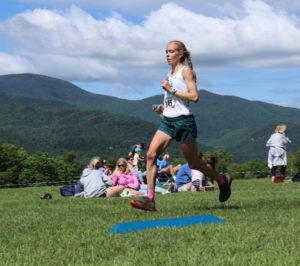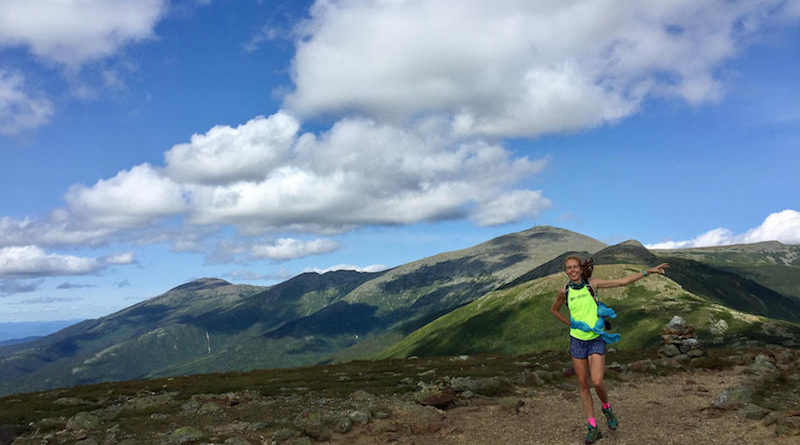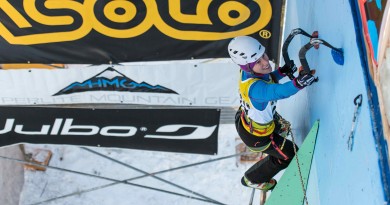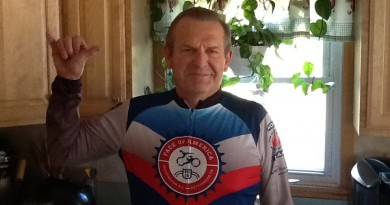The Mountain Runner to Watch
Name: Heidi Caldwell. Age: 27. Lives in: Craftsbury Common. Family: Parents Margaret and Tim; sister Lucy (29), brother Patrick (25). Primary sports: Running, hiking, cross-country skiing. Secret: Born on a leap day. Aspires to be: A tennis player
Heidi Caldwell is Craftsbury Outdoor Center’s first ever full-time, year-round running director, and this year she’s taken some big races by storm. In June, she won the Catamount Ultra 25K with a time of 1:58:28 just a week after coming from behind to tie for first place in the Mount Washington Road Race on June 15. In her second marathon attempt, she took 29th in the 2019 Boston Marathon to earn a PR of 2:54:00—despite many other runners dropping out due to persistent sleet, rain and snow. She’s also part of a family of incredible athletes. Her grandfather, John Caldwell of Putney, Vt., is a former Olympic skier and coach who authored the definitive book on cross-country skiing. Her father Tim Caldwell competed in four winter Olympics in Nordic skiing starting in 1972, her uncle Sverre is also a former Olympian and recently retired as coach for the Stratton Mountain School T2 team and her first cousin is two-time Olympic Nordic skier and current team member Sophie Caldwell.
On June 15, you became the first person to tie for a first place win in the Mount Washington Road Race, catching up to Brittni Hutton in the last thirty seconds on the steepest portion of the course to finish neck and neck in 1:16:17. What was that like and how did you get there?
I love that race! I ran it for the first time in 2018 and was excited to get back this year. Something I try to focus on with steep terrain like what you see on Mt. Washington is shortening my stride going uphill and building in recovery time as I move. I made a decision to do a lot of power hiking this year and focused on making myself take 10 strong hiking strides every mile or so throughout the race. I think that was what gave me the reserves to catch up at the end.
You grew up in a family of Nordic skiers. How did you become a runner?
When I was growing up, we had a weekend ritual of going for a hike as a family. In the winter, we’d go skiing together, either downhill or cross country. Being active was something that we always did and did as a family. My parents have always exercised in the morning together—whether it’s a hike, run or ski—and they’re still doing it. It’s a habit I admire. Some of my earliest memories are from a baby jogger. My parents would take all three of us out for their morning run and we would cheer for them from the stroller when they went up a hill.
Running was always around me growing up, and I loved running to play. I started running cross-country freshman year of high school at Hanover High after playing soccer. I was lucky to have an amazing coach who fostered a really healthy love of running and of competing. I attribute a lot of my love of the sport to him and to the other women on that team.
You ran track successfully at Brown University.
For a long time, I thought I wanted to be a skier and go to Dartmouth. I was still cross-country skiing through sophomore year of high school, and I really thought that was my main sport. Running the track was what got me to switch and led me to focus on running in college. I ended up having two really amazing coaches at Brown and some amazing teammates who are still some of my best friends. My senior year, I set a goal to break 16 minutes in the 5K. I’m proud of the time I achieved, 16:05:00, but I never broke that barrier. I never thought I would be as competitive as I was, and by the end of my career I was pretty burnt out on track races.
After you graduated from college, what did you do?
I took a break from running! The only running I did that first summer was to hike or run all of the 4,000-footers in New Hampshire. I was living at home, without a job and I thought getting back to my roots would be a good way to figure out what I wanted to do next. In the end, it reminded me how much I loved the mountains because of those early hikes with my family—something I’d stopped doing in Providence. I ended up moving to Boston to coach cross- country running at Tufts University, still with no intention of racing.
You have a master’s degree from the University of Vermont in counseling. What led you down that path and how does it relate to your work as a running coach?
Working as a coach at Tufts, I became part of a support system for the students I worked for, several of whom experienced mental health challenges. I felt under-equipped to help them in a holistic way. So many people come to running for relief from all kinds of things in their lives. I think it has a grounding effect on people, regardless of how they engage it. I decided to go back to school to get my master’s degree in counseling at the University of Vermont, with a focus on school counseling for middle school and high school kids.
I feel really fortunate to work at Craftsbury Outdoor Center. As a running coach, I work with kids, master athletes and community members. The work I do there is the perfect marriage between counseling and coaching.
Tell us about your role at Craftsbury Outdoor Center.
It’s a new position. I started in spring 2018 at a time when the Outdoor Center decided to make running a year-round presence in their programming. It opened the door for more community events, like our weekly 5K trail races, Sunday morning group runs and our weekly Thursday night community track practices. Those are my favorites. You get people who’ve never been on a track before and ex-competitive racers together, local middle schoolers and 60- to 70-year-olds. Over the summer, we have a lot of running camps and that’s also fun. This September, we are hosting a 10-miler fundraiser for a local general store.

What led you to tackle racing longer distances?
When I moved to Burlington for graduate school in 2017, I got this old itch back to run the Boston Marathon, so I registered for the Burlington City Marathon. I thought, “I’ll just see if I can break three hours, run in Boston and do it once and be done.”
The Burlington City Marathon was my first marathon, and it was tough! I was underprepared and didn’t really know what I was getting myself into. I ran into some stomach issues that landed me with a time of 3:10:00. But I qualified for Boston and in 2018, I ran the race in 2:54:00 to finish as the 29th female. I think the fact that a Nor’easter hit the morning of the race, so we were running with wind and snow and sleet helped me. The New Hampshire mountain lover in me was like, “This is great!” even as other racers were apparently dropping out. I had a blast.
What do you love about longer distances?
I’ve gotten psyched on road racing and trail running over the last few years, and it’s just a completely different way to train from what I did in college. As a coach, I have fun treating myself as a guinea pig and testing out different trainings and workouts. I love how many realms there are to engage with in competitive running. I may be done competing in track and cross-country, but it’s been exciting to try other disciplines like marathon, half marathon, mountain running and trail racing. I’ve learned that you can still experience a sport you’ve loved forever and push your body in a different way.
What are you eyeing now, on the horizon?
Well, last fall, I injured myself. I ran 1:13:40 at the Newburyport Half Marathon in October 2018—my best time by a long shot. I was training for the California International Marathon, with hopes of running an Olympic Trials qualifying time. I felt invincible! I was running more than I ever have and got a pelvic stress fracture from overuse.
I spent the winter healing and skiing again—my second favorite activity. It was a great break from running. Now, I’ve got a bee in my bonnet about running the marathon time I know I can. I’m eyeing a couple of marathons this fall to qualify for Olympic trials.
After that? I’m interested in dipping a toe into more mountain running and the fastest-known-time world. I don’t think my body loves marathon training all that much.
What was it like growing up in a family of Olympians?
I give my parents and aunts and uncles and grandparents tremendous credit for fostering a love of the outdoors and of being outside in all of us in a way where there was no pressure built around it. I think most all of us 10 cousins on my dad’s side have a true love of being in the mountains in a variety of different ways. Growing up, hiking in the summers and skiing in the winters was just something we did. The adults around us kept it pretty low-key.
A lot of people don’t believe me when I say that because of how successful our family has been in competitive spheres, but that love of the mountains has been the real inspiration for those of us who have reached higher levels of competition as adults. My immediate family still goes on hikes together, and when all of us cousins get in one place, we do the same. I feel fortunate for that gift, which started with my grandparents and was passed down to me by my parents.
Featured Photo Caption: Heidi Caldwell is just as at home running long mountain trails like the Presidential Ridge in New Hampshire’s White Mountains as coaching on the track at Craftsbury Outdoor Center. Photo courtesy Heidi Caldwell



